- Home
- Greg Keyes
Lord of Souls: An Elder Scrolls Novel Page 2
Lord of Souls: An Elder Scrolls Novel Read online
Page 2
“And yet this time you demand my attention. In my own house.”
“Yes, Prince.”
The massive lids of Malacath’s eyes lowered over his eldritch gaze. His nostrils widened.
“It’s still there,” the prince’s voice ground out, almost below the level of hearing. “This place, this shadow of a garden, this echo of something that once was—you know such phantoms, Sul?”
“Yes,” Sul husked.
“You loved a woman, and for her you destroyed your city, your nation, and your people.”
“I did not mean to,” Sul said. “I only meant to save her life. It was Vuhon—”
“Do not diminish yourself. Do not seek to lessen the beauty of the deed.” Malacath opened his eyes and stared at them, and now Attrebus felt as if hot brass was being poured into his skull.
“I have healed your broken body, and that of your companion,” he said. “What should I do with you now?”
“Release us,” Sul said.
“To do what?”
“Destroy Umbriel.”
“You tried. You failed.”
“Because we did not have the sword,” Attrebus managed to gasp through the cloying dust.
“What sword?” The air seemed to thicken, and all the hairs on Attrebus’s arms stood out like quills.
“There is a sword named Umbra—” Attrebus began.
“I know it,” Malacath said. “A tool of Prince Clavicus Vile, a stealer of souls.”
“More than that,” Attrebus replied. “The sword was prison to a creature that also calls itself Umbra. This creature escaped the blade and stole much power from Clavicus Vile, and it is that power that motivates Umbriel, the city Sul and I seek to destroy. We believe that if we can find the sword, we can use it to reimprison this creature and defeat Umbriel.”
Malacath just stared at him for a moment, and then the great head leaned toward one vast shoulder a bit. There was something oddly childlike about the motion.
“I have heard that Vile is weak, and that he searches for something. I have no love for him. Or any of the others.” He glanced back at Sul, his vast brows caving into a frown. “How I laughed when you betrayed them, turned your homeland into no less an ash pit than my realm. The proud issue of the Velothi, humbled at last. By one of their own. And still there is the curse you made, unfulfilled.”
“You can help him fulfill it,” Attrebus blurted. He was shaking uncontrollably, but he tried to keep his voice steady.
“You knew who Sul was the minute you saw him,” he went on. “You remember his curse after all these years. You healed us and interviewed me. In disguise. To see what we’re up to. To assure yourself that the curse Sul made all those years ago is still walking with him. That he still craves vengeance.”
Malacath’s head shifted again, and behind him vines collapsed and formed into a cloud of black moths that swarmed about them.
“There are a few things I have a sort of love for,” the daedra said. “What Sul carries with him is one of those things. So yes, I will help you further. The sword, Umbra—do you know where it is?”
Sul’s mouth set in reluctant lines.
“How else will you go there if I do not send you?”
“Somewhere in Solstheim, I believe,” Sul finally replied. “In the hands of someone who wears a signet ring with a draugr upon it.”
Malacath nodded; to Attrebus it seemed a mountain was falling toward him.
“I can take you to Solstheim,” the prince said. “Do not disappoint me.”
Then both gigantic eyes focused on Attrebus. “And you—if I ever have use for you, you will know it.”
“Yes, Prince,” Attrebus replied.
The god grinned a mouthful of sharp teeth. Then he slapped his palms together.
“It’s real,” Mazgar gra Yagash breathed, staring, fighting the urge to draw her sword.
It wasn’t often you saw a mountain fly.
She doffed her helmet for a better look. As it passed beyond the tallest birches, she saw how it hung in the sky—an inverted mountain, with the peak stabbing toward the land below.
Next, her gaze picked out the strange spires and glistening structures atop the thing, structures that could only have been made by some sort of hands. A forest clung to the upper rim as well, its boughs and branches dropping out and away from it.
“Why would you doubt it?” Brennus asked, his hands working fast with pen and paper, sketching the thing. “It’s what we came to see.”
“Because it’s ridiculous,” she said.
“I’ve never heard an orc use that word,” he murmured. “I guess I thought you people believed in everything.”
“I don’t believe your nose would stand up to my fist,” she replied.
“Fair enough,” he said. “I don’t believe that either. But since I outrank you, I also don’t think you’ll hit me.” He pushed rusty bangs from his face and looked off at the thing. “Anyway—ridiculous or not, there it is. Aren’t you supposed to be doing something?”
“Guarding you,” she replied.
“I feel so safe.”
She rolled her eyes. He was technically her superior, which galled, because he wasn’t a soldier—or even a battlemage. Like most of the wizards in the expedition, his expertise was in learning things from a distance. His rank had been awarded by the Emperor, days before they’d left the Imperial City.
But he was probably right—as hard as it was not to stare at the thing, it was their immediate surroundings she ought to be taking in.
They were on a high, bare ridge, about thirty feet from the tree line in any direction. The air was clear and visibility good. Up ahead of her, four of Brennus’s fellow sorcerers were doing their mysterious business: chanting, aiming odd devices at the upside-down flying mountain, conjuring invisible winged things she noticed only because they passed through smoke and were briefly outlined. Two others were surrounding their position with little candles that burnt with purple-black flames. They set those up every time they stopped; the candles were somehow supposed to keep all of this conjuring from being noticed by anyone—or anything.
Mazgar put her hand on the ivory grip of Sister—her sword—squinted, and licked her tusks. “I make it about six miles away. What do you reckon?”
“A little more than eight, according to Yaur’s ranging charm,” Brennus said.
“Bigger than I thought.”
“Yah.” He put the notebook down and unpacked something that looked like a spyglass but Mazgar figured wasn’t. He peered through it, mumbled gobbledygook, turned a dial on the device, and looked again. He scratched his red hair, and his sallow Nibenese features fell in a frown.
“What’s the matter?” she asked him.
“It’s not there,” he said.
“What do you mean?” she said. “I’m looking right at it.”
“Right,” he said. “Bit of a contradiction, I know. And I’m sure it is there, somehow. But all my glass sees is a bubble of Oblivion.”
“A bubble of Oblivion?”
“Yah. You know, the nasty place where the daedra live? Beyond the world?”
“I know what Oblivion is,” she gruffed. “My grandfather closed one of the gates Dagon opened between here and there, back when.”
“Well, this is like a gate, but wrapped around itself. Pretty odd.”
“Does that tell us how to fight it?”
He shrugged. “I can’t think how it would,” he said. “Anyway, the plan is to not fight it. We’re just here to find out what we can and report back to the Emperor. It’s still moving north into Morrowind. It may never threaten the Empire at all.”
Mazgar looked at the island again. “How can that not be a threat?” she muttered. She felt the coarse hairs on the back of her neck standing and her heart quicken. Brennus was looking at her in apprehension, and she realized she’d been growling in the pit of her throat.
“Don’t worry,” he said.
“It sees us,” she said.
“I doubt that,” he replied.
“No,” she snapped. “I can feel it, feel its eyes …”
“Is this supposed to be some sort of orcish sixth sense? The kind you get from not bathing?”
“I’m not joking, Brennus, something isn’t right. I feel—”
But then the wind shifted, and she got the smell.
“Dead things,” she snarled, clearing Sister from her sheath. Then she raised her voice. “Alarum!” she howled. She grabbed Brennus by the arm and hustled him toward the other sorcerers, where her fellow warriors were hastily trying to form a phalanx.
She wasn’t quite there when they came out of the trees.
“So that’s true, too,” she said.
“Divines,” Brennus breathed.
They looked as dead as they smelled. Many had been Argonians, obvious by their rotting snouts, decayed tails, sharp teeth set in worm-festered gums. Others looked to have been men or mer, and a few were just—things. They moved twitchily, as if uncertain how to use their limbs, but they came at a fast march.
And they were marching, organized, falling into ranks as the landscape permitted. They were unevenly armed—some had swords, maces, or spears, but more than half had crude clubs or no weapons at all—but there were a lot of them, many times more than their thirty.
What surprised Mazgar most were their eyes. She had heard the rumors that an army of corpses walked beneath the flying city. She had imagined them as dumb, cattle-eyed beasts. What she saw as they drew near was something different, a glitter of malicious intelligence, a dark joy in the harm they promised.
“They’re coming up from the south, too,” someone shouted.
That was bad news. They’d left the horses and most of the supplies down there, not to mention their remaining six soldiers to guard them.
“Form up,” Captain Falcus hollered. “We’ve got fighting to do.”
“I thought they were supposed to be under the island,” Mazgar said. “These are a long way from it.”
“Well,” Brennus replied, “there’s the value of scouting, eh? Now we know something we didn’t before. They can send their troops out. Way out.”
“We can’t let them trap us up here,” Falcus said. “We’re going to have to pick a direction and cut through.”
“South takes us home, Captain,” Merthun the Wall shouted.
“South it is,” the captain said. “Re-form, now.”
Mazgar moved to the back of the formation, along with Jarrow, Merthun, and Coals. She pulled her shield off her back and got ready, watching the rotting things approach.
“And you thought this wasn’t going to be any fun,” Brennus said, at her back.
Falcus shouted, and the phalanx started moving behind her. Mazgar and her line walked backward, slowly. The dead sped up, and when they were six yards away, they charged.
She howled, and Sister swung at something that had once been a two-legged lizard. The sword smashed into its head and it split open, spilling maggots and putrescence all around her. The body came on, and so she slashed at it, still retreating.
Just up the line she heard Jarrow curse and gurgle.
“Jarrow’s down,” Merthun shouted. “Close the gap.”
They fell back, yard by yard, leaving a wake of rotting, twitching parts. She saw Jarrow’s body, facedown, receding.
Then she saw him start to rise, surrounded by the things.
“Jarrow’s still alive!” she bellowed.
“He’s not,” Merthun shouted back, his huge hammer rising and falling into the line of the enemy.
“But—” she began. Then she saw Jarrow’s wound and the dark gleam in his eye, and knew it wasn’t him anymore.
“Well, that’s no good,” Brennus opined.
“There’s the south line,” Falcus shouted. “Double time, soldiers. Rearguard, keep them off. We break through or die.”
“I’m not dying here,” Mazgar snarled, and let Sister do her work.
ONE
Wind opened Colin’s eyes, but it was the unfastened window that sped his heart, and the utter lack of sound that sent his fingers to the knife under his mattress. A hand met his there and gripped his wrist, hard. He swung over to kick at the vague shadow, but he was grasped at the ankles as well, and a bag was forced over his head, followed by a return to sleep that would have been gentle if part of him wasn’t screaming to the rest that he wouldn’t ever wake up.
He did wake again, however. The bag and the cloying scent of somniculous remained, but the drug itself was obviously dissipated. He was lying on a hard but inconstant surface, and he soon recognized by the motion that he was in a boat, on water. His hands and feet were efficiently bound. His captors did not speak, but he could hear their breathing and exertions at the oars. He couldn’t make out anything through the sack except light, but he felt the sun on his skin and guessed it was approaching midday.
Not much later, there was a bit of jostling and then the shock of the boat coming on shore. He smelled pine.
They cut the bindings on his feet and made him walk. He kept thinking he ought to say something, but his kidnappers behaved so professionally he knew there wasn’t much point. There was no talking them out of whatever they were doing with him. All he could do was wait, and wonder. Would he feel it? Would he know anything had happened?
Colin killed a man once. He died confused, begging, unwilling to admit even as the knife cut into him what was happening.
He wished he could have seen his mother again, and—realizing he was weeping—felt ashamed. He’d wanted to be braver.
The hand on his arm came away. He tried not to shake.
Then one of the men made a peculiar sound, a sigh like a very tired man finally lying down.
“What?” the other asked, before sucking a sharp breath.
Colin heard two distinct thumps—then for a moment, nothing. He wondered if he should run.
“Who do you work for?” a feminine voice asked.
He recognized it, and a deep chill wracked through him. The last time he’d heard that voice had been in a house in the Market District, just before its owner slaughtered at least eight men.
“Come,” she said. “Tell me.”
“I’m not at liberty to say,” he replied.
“Keep still,” she said. A moment later the sack came off his head.
And there she was, regarding him, Letine Arese. Her small frame, turned-up nose, and short blond hair made her seem almost like a little girl, but he knew her to be thirty-one years of age, and her blue eyes held a cold intensity that was quite un-childlike.
Those eyes narrowed now.
“You look familiar,” she said. “I’ve seen you. I suppose that makes sense.”
He glanced behind her, at the two bodies on the ground. Both were male; one was an Argonian, the other a Bosmer. They both seemed quite dead, although he could not see the cause.
“They brought you out here to kill you,” she said.
“I gathered that,” he replied. “I’m grateful you stopped them.”
“Are you? We’ll get back to that in a moment.” She folded her hands behind her back. She was dressed in Bosmer woodsman style, with high boots and soft leather vest and breeches. It was an odd look for her, in his experience—he’d only ever seen her in relatively fashionable city attire.
“What would you say if I told you they worked for me?” she asked.
“I would be confused,” Colin said carefully.
“Yes, I should hope so,” she told him. “They noticed you spying on me and brought it to my attention. So of course, I did a little checking of my own. Colin Vineben, from Anvil. Your father is dead, and your mother does laundry. You were recommended for and received training for the Penitus Oculatus, and recently were named an inspector in that organization. It was you who discovered the massacre of Prince Attrebus’s personal guard and the apparent murder of the prince, and you who suggested to the Emperor that the prince wasn’t actually dead
. Which, as it turns out, you were right about. And now you’re spying on me, but without, it seems, any official authority to do so. So I wonder if you’re employed by someone else.”
“Why did you kill them?” he asked.
“Because otherwise, I would have had to kill you,” she snapped. “Now I have to account for them, pretend I sent them on a mission to someplace fatal. Otherwise, the two of them would have wondered why you were still walking, and after a while that wonder would have spread its way up to the minister himself.”
“I don’t understand,” Colin said.
“I’m risking my neck for you, you idiot,” Arese snapped suddenly. “Can’t you see that?”
“I can see it,” he replied. “I just don’t get why.”
She pulled a knife from her belt and stalked toward him. His chest tightened, but she merely cut the ropes that held his hands behind his back. Then she stepped back a bit and untied her pants, loosening the laces and pulling one side down, exposing her hip.
“You know what that is?” she asked, indicating a small black tattoo of a wolf’s head.
He did, of course. It was the Emperor’s personal brand, worn only by his innermost circle.
He didn’t say anything, but she saw he recognized it, and pulled the breeches back up, tying them again.
“He put me in the minister’s office ten years ago,” she said. “No one knows but him and me. And now you.”
“Why are you telling me this?”
“Because I need help, and I think we may have a common purpose.”
“What’s that?”
“To discover why Minister Hierem wants Prince Attrebus dead.”
“Does he?”
“I should know,” she said. “I made the arrangements for the ambush on his orders.”
“Why?” Colin exploded. “If you’re loyal to the Emperor—”
She barked a laugh. “You knew,” she said. “You were there, weren’t you? When I took care of Calvur and his thugs. I knew someone was there!” She closed her eyes for a moment, looking very tired.
“I didn’t mean for the prince to come to harm,” she said. “If I could have gotten word to the Emperor, I would have. It was impossible at the time, at least without revealing myself to Hierem. In the end, a decision had to be made.”

 Godzilla
Godzilla Godzilla vs. Kong
Godzilla vs. Kong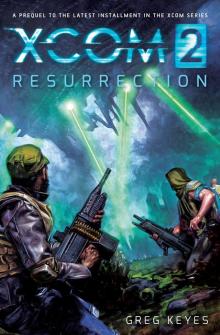 XCOM 2- Resurrection
XCOM 2- Resurrection Independence Day: Crucible (The Official Prequel)
Independence Day: Crucible (The Official Prequel)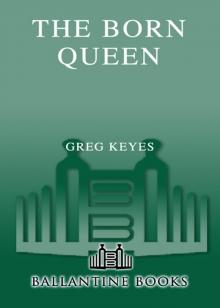 The Born Queen
The Born Queen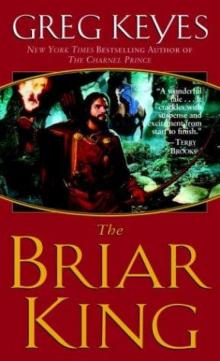 The Briar King
The Briar King Star Wars The New Jedi Order - Dark Journey - Book 10
Star Wars The New Jedi Order - Dark Journey - Book 10 Star Wars: New Jedi Order Book 8b: Emissary of the Void
Star Wars: New Jedi Order Book 8b: Emissary of the Void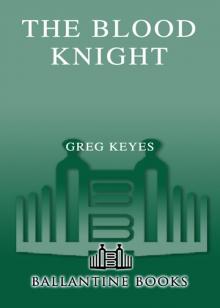 The Blood Knight
The Blood Knight Star Wars - Edge of Victory - Book 1: Conquest
Star Wars - Edge of Victory - Book 1: Conquest Edge of Victory 2 Rebirth
Edge of Victory 2 Rebirth Lord of Souls: An Elder Scrolls Novel
Lord of Souls: An Elder Scrolls Novel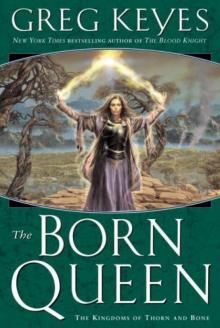 The Born Queen tkotab-4
The Born Queen tkotab-4 Rebirth: Edge of Victory II
Rebirth: Edge of Victory II Conquest: Edge of Victory I
Conquest: Edge of Victory I Emissary of the Void
Emissary of the Void The Blackgod
The Blackgod Star Wars The New Jedi Order - The Final Prophecy - Book 19
Star Wars The New Jedi Order - The Final Prophecy - Book 19 The Infernal City
The Infernal City The Charnel Prince
The Charnel Prince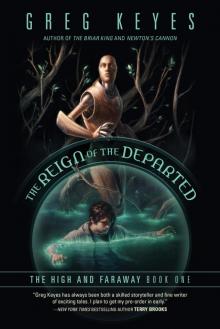 The Reign of the Departed
The Reign of the Departed Lord of Souls es-2
Lord of Souls es-2 Chosen of the Changeling
Chosen of the Changeling Dawn of the Planet of the Apes
Dawn of the Planet of the Apes Footsteps in the Sky
Footsteps in the Sky PACIFIC RIM UPRISING ASCENSION
PACIFIC RIM UPRISING ASCENSION The Final Prophecy: Edge of Victory III
The Final Prophecy: Edge of Victory III